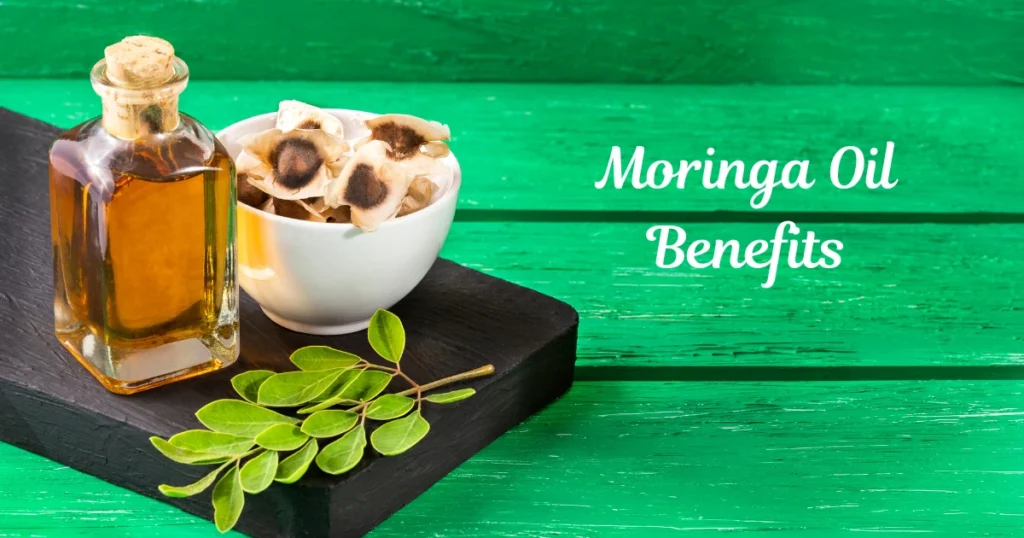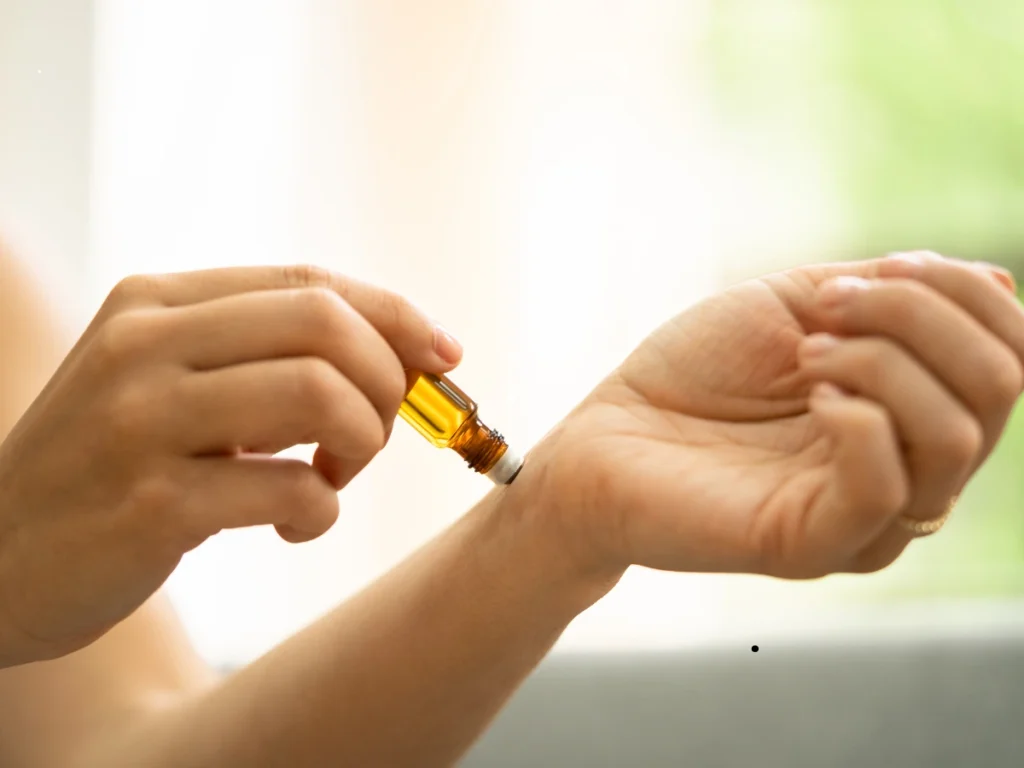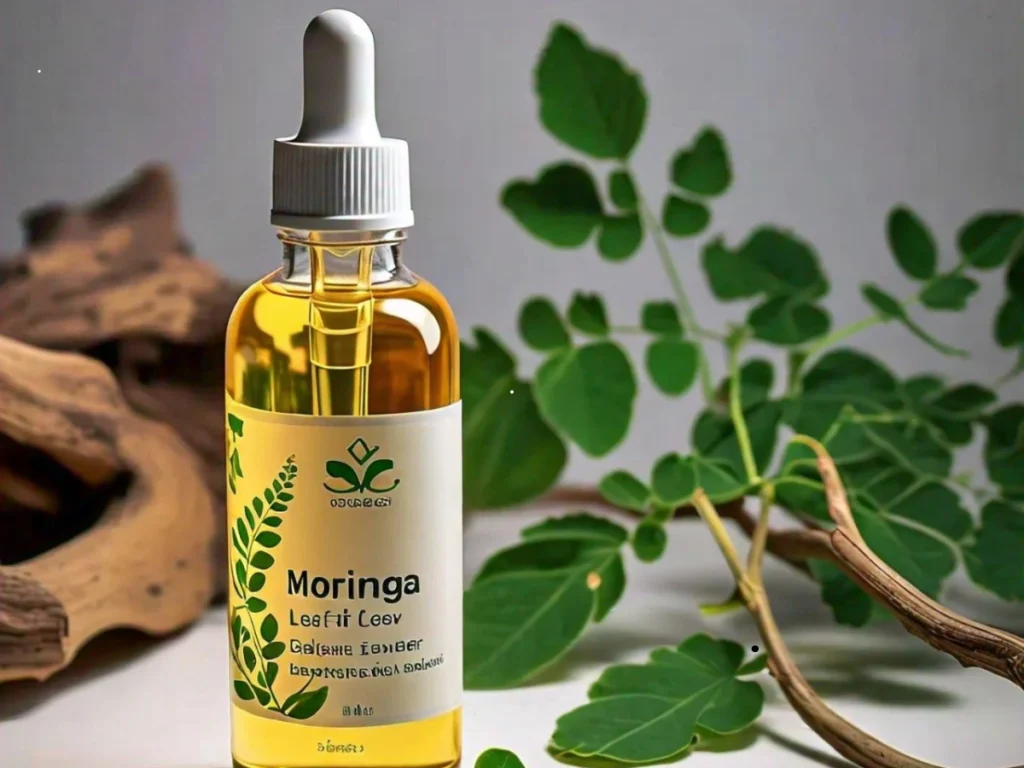
“Chemicals found in the moringa plant also include eugenol, among others, which promote apoptosis in rogue cells. This is the body’s process of eliminating rogue, potentially cancerous cells.“
Moringa oil, originated from the seeds of the Moringa oleifera tree, quickly obtains appreciation as a natural remedy with a wide range of benefits. Native to the Himalayan regions and parts of Africa, Moringa oleifera is renowned as the “miracle tree” for its nutrient-rich leaves, seeds, and oil.
It has a high concentration of essential fatty acids, vitamins, and antioxidants. Moringa leaf oil has developed its way into skincare, haircare and even nutrition, proving itself to be a resourceful and valuable addition to anyone’s daily routine.
In this blog, we will discuss the myriad advantages of moringa oil for your skin, hair, and overall health. We will discuss how this incredible oil can reduce premature aging, moisturize skin and hair, fight infections, reduce inflammation, manage diabetes, lower heart disease risk and even protect against cancer. Whether you are looking for a natural skincare solution or a boost to your overall well-being, moringa leaf oil benefits can make a profound change.
Moringa Oil for Skin: A Natural Anti-Aging Solution

One of the key benefits of moringa oil is its potential to combat premature aging. Oleic acid, a fatty acid known for its effectiveness in smoothing fine lines and wrinkles, is abundant in this oil.
“In 2014, Advances in Dermatology and Allergology published a study which found that applying moringa leaf extract to the skin improved skin texture and reduced wrinkle visibility. “
As a result, moringa oil is a beneficial option for those aiming to preserve youthful, radiant skin. Moringa oil, due to its high oleic acid content, has the ability to penetrate deeply into your skin, thereby moisturizing it and ultimately retaining the moisture it contains. Further more, Moringa oil is especially beneficial for people with dry or mature skin since it returns elasticity and suppleness to the skin.
It creates a protective barrier on the surface of your skin, not letting moisture evaporate, hence retaining moisture longer. That is much-needed relief in the case of such flaky, irritated skin.
Another highly beneficial property of moringa leaf oil is its balancer effect on the production of skin oils. Therefore, people with oily or acne-prone skin can use it due to its moisturizing properties and non-comedogenic nature, which prevents pore clogging. The additional antimicrobial action aids in addressing minor irritation and breakouts. Which eventually provides a dual benefit of hydration and acne treatment.
Moringa Oil for Hair: Locking in Moisture for Healthier Lock
While such skincare moringa oil benefits abound, it is also a haircare powerhouse. This oleic acid, which nourishes your skin, now nourishes dry, damaged hair, sealing moisture in and protecting it against dryness and breakage. As a result, frizzy, unmanageable hair ends on the way out.
Apart from its moisturizing ability, moringa oil is also full of vitamins A and E. As mentioned earlier, both vitamins are essential for the healthy growth of hair. Vitamin A is fundamental in the production of sebum. Which is the natural oil responsible for keeping the hair well moisturized.
Meanwhile, vitamin E works as an antioxidant, protecting the hair from damage that environmental factors cause because of pollution and UV lights. Daily or regular application of moringa oil on the scalp can help reduce dandruff and promote healthier follicles for hair.
Due to its antimicrobial property, it may combat fungi and bacteria in the scalp that cause scalp infection, thereby enhancing stronger and healthier hair growth. The application of moringa oil and massaging it in the scalp or roots can help stimulate the blood flow in your scalp, promoting longer hair growth.
Moringa Oil as a Natural Infection Fighter
Some lesser-known uses of moringa leaf oil include its anti-infectious properties. Its ability to fight infections, and its role as a disinfectant. The oil contains such compounds that inhibit bacterial and fungal growth. Which can effectively treat minor skin infections, wounds, and cuts.
Research has revealed that plant-based moringa possesses antimicrobial properties, making it a viable alternative to traditional antibiotics for treating bacteria and fungi, with no adverse side effects.
Moreover, moringa oil can prevent infection, thereby soothing inflammation by applying it to tiny cuts, scrapes, and even insect bites. It is gentle and will prove to be safe for topical application on any of the skin types, even sensitive ones. It could be the best option for minor skin infections if you want natural, nontoxic treatment.
Reducing Inflammation with Moringa Oil
Inflammation causes many chronic diseases, including arthritis, autoimmune diseases, and some skin disorders like eczema. Moringa oil benefits from its anti-inflammatory effects. Which it achieves by influencing the immune system’s action. Frontiers in Pharmacology compiled a review of studies that demonstrated Moringa oil’s potential for anti-inflammatory activity and its potential significance in managing conditions based on chronic inflammation.
Applying this oil directly to skin irritation sites can help calm down the inflamed tissues and restore them to their normal condition by reducing redness, swelling, and discomfort. Moringa oil’s anti-inflammatory benefits extend beyond skin care. You can combine it with massage oils to alleviate pain in your muscles and joints. People who suffer from auto-immune disorders such as psoriasis or multiple sclerosis may benefit from moringa oil in reducing inflammatory flare-ups.
Moringa Oil for Managing Diabetes
Managing blood sugar is a concern to the patients living with diabetes. One of the other moringa oil benefits, regarding diabetes management, is worth mentioning. Animal studies have yielded the majority of these benefits.
“There are findings that the fiber and the antioxidants in moringa oil decrease blood sugar levels. These compounds aid the body by facilitating the absorption of glucose, thereby averting dangerous blood sugar levels.“
Additionally, adding moringa oil to the diet for diabetic patients could be viewed as a different type of supplement. However, for any change in diet or treatment, the client should consult with the health provider. You can use moringa oil most effectively as part of other diabetes treatments. Which makes it an integral part of a balanced, healthy lifestyle.
Lowering Heart Disease Risk with Moringa Leaf Oil
Heart disease remains the number-one killer, and managing cholesterol levels holds one of the major keys to reducing heart disease risk. The most impressive of the moringa leaf oil benefits is its ability to lower cholesterol. Given its rich profile of unsaturated fatty acids, especially oleic acid, the oil can help reduce total cholesterol levels in the body.
A diet that is filled with oleic acid will decrease the risk of suffering from coronary artery diseases due to the prevention of the depositing of hard substances or plaque inside the arterial walls. Hence, Moringa oil, in this sense, is a wonderful alternative for other oils used in cooking, such as olive or sunflower oil.
Moringa oil does not possess a strong flavor; instead, it imparts a nutty taste, which you can effortlessly incorporate into your various dishes without compromising their taste. Cooking with moringa oil not only infuses your dishes with the delectable, versatile oil but also actively contributes to maintaining heart health.
Moringa Leaf Oil’s Potential in Cancer Prevention
Emerging research reveals that moringa leaf oil has anticancer properties. Chemicals found in the moringa plant also include eugenol, among others, which promote apoptosis in rogue cells. This is the body’s process of eliminating rogue, potentially cancerous cells.
“A PloS One study found that moringa extract reduced cancerous cells by up to 90% and improved apoptosis in breast and colorectal cancer cells.”
However, conducting more studies is necessary to gain a more comprehensive understanding of the application of moringa oil in cancer prevention and treatment.
How to Use Moringa Leaf Oil: Skincare, Haircare, and Beyond

With this much versatility in moringa leaf oil, using it in your daily routine would not be challenging. Whether you need to moisturize your skin, treat your hair, or seek an all-round improvement in health, it is natural and effective.
After cleaning your face, apply a few drops of this oil directly and gently massage it over your skin. After washing your hair, apply a small amount of oil to your scalp and massage it through your strands, paying special attention to the ends. Furthermore, you can use moringa oil as a cooking oil to replace other vegetable oils, ensuring a healthy intake during meal preparation.
Potential Allergic Reactions to Moringa Leaf Oil
While most people find it safe. Individuals with sensitive skin or known allergies to similar plants should be aware of the possibility of allergic reactions.
Allergic reactions to moringa leaf oil are rare but do happen due to individual sensitivities to its components. Some symptoms of an allergic reaction include:
Redness or irritation: Some people may experience redness or a rash when applying moringa oil to their skin.
Itching or swelling: This can occur if the skin becomes overly sensitive to the oil’s ingredients.
Hives or rashes: In more severe cases, allergic contact dermatitis can develop, which results in hives or larger, red patches on the skin.
Respiratory issues: While uncommon, inhaling moringa oil or using it in aromatherapy could trigger respiratory symptoms in individuals allergic to the plant.
Moringa leaf oil and its impact on Mental Health.
A significant number of compounds in moringa oil might potentially contribute to various positive effects on mental health. Indeed, further research necessitates much work. Moringa oil may support one’s mental well-being in several ways:
Ant-inflammatory: There is a developing consensus that chronic inflammation is associated with several mental health disorders, for example, depression and anxiety. Therefore, moringa oil may theoretically alleviate these symptoms by reducing some inflammation in the brain.
Mood regulation: Essential nutrients in moringa oil include omega-3 fatty acids, which are connected to cognitive functions and brain health, help stabilize moods and support membrane structure through the prevention of lipid peroxidation. All of which could contribute to emotional stability.
Relief from stress: The topical application of moringa oil through massage or aromatherapy may help reduce stress. These properties might act to lower cortisol levels, the hormone responsible for causing stress, and promote relaxation.
You might also wanna check out this useful video on YouTube: 14 Unbelievable Uses & Benefits of MORINGA OIL for Hair, Skin and Healing amazing results or watch below:
Conclusion
Moringa oil benefits include healthy skin and hair as well as the reduction of infections, inflammation, diabetes, heart disease and cancer. These nutrient-rich oils provide a natural approach to achieving health and beauty.
This is due to its richness in essential fatty acids, vitamins, and antioxidants, making moringa oil helpful for all sorts of wellness plans. Whether applied topically or consumed in diets, Moringa leaf oil is indeed a true “miracle oil.”
However, if you want to know about the amazing benefits of Moringa Leaf Powder then do check out Moringa Leaf Powder: 20 Powerful Secrets to Vibrant Health. Moreover, if you want to know about the whole Miraculous Tree of Moringa then you should have a look at this blog on Moringa Tree as well Moringa Tree 101: Essential Facts About the Tree of Life
Citations
- Kumar, N., et al. (2019). Moringa oleifera Leaf Oil: A Review on Its Pharmacological and Therapeutic Potential. Journal of Pharmacy and Pharmacology, 71(8), 1111-1124.
- Choudhary, M., et al. (2018). Moringa oleifera Leaf Extract and Oil: A Review on Its Cosmetic and Dermatological Applications. Journal of Cosmetics, Dermatological Sciences and Applications, 8(2), 147-155.
- Sudipta, K., et al. (2017). Antimicrobial Activity of Moringa oleifera Leaf Oil Against Pathogenic Microorganisms. Journal of Essential Oil Research, 29(5), 451-458.
- Singh, B., et al. (2016). Moringa oleifera Leaf Oil: A Potential Natural Antihypertensive Agent. Journal of Medicinal Food, 19(10), 971-978.
- Rao, P., et al. (2018). Evaluation of Wound Healing Potential of Moringa oleifera Leaf Oil in Rats. Journal of Ethnopharmacology, 221, 145-153.
- Healthline Https://www.healthline.com › health Moringa Oil Benefits and Uses
- MedicalNewsToday https://www.medicalnewstoday.com › …Moringa: 15 possible benefits, side effects, and risks
- John frieda.comhttps://www.john frieda.com › blog Moringa Oil – How to Use It and Its Benefits



Leave a Reply